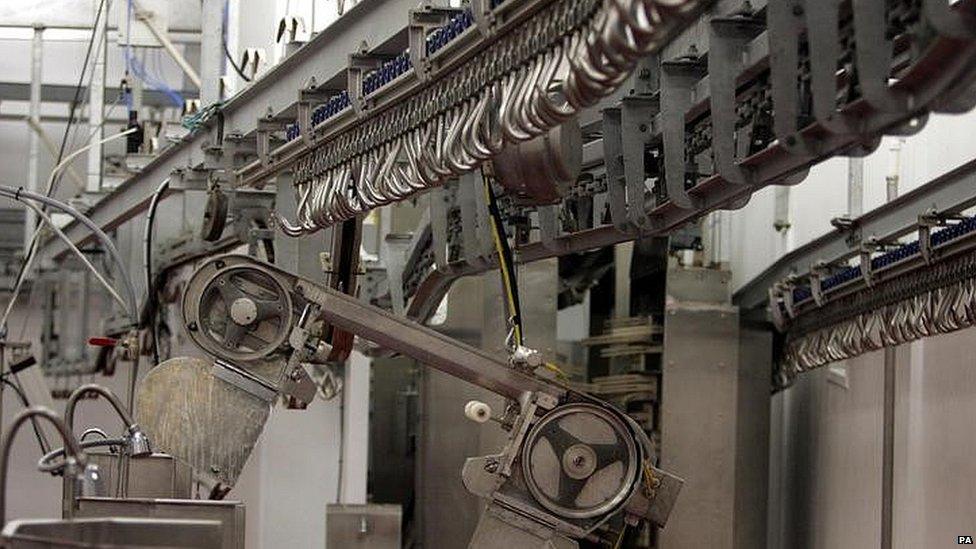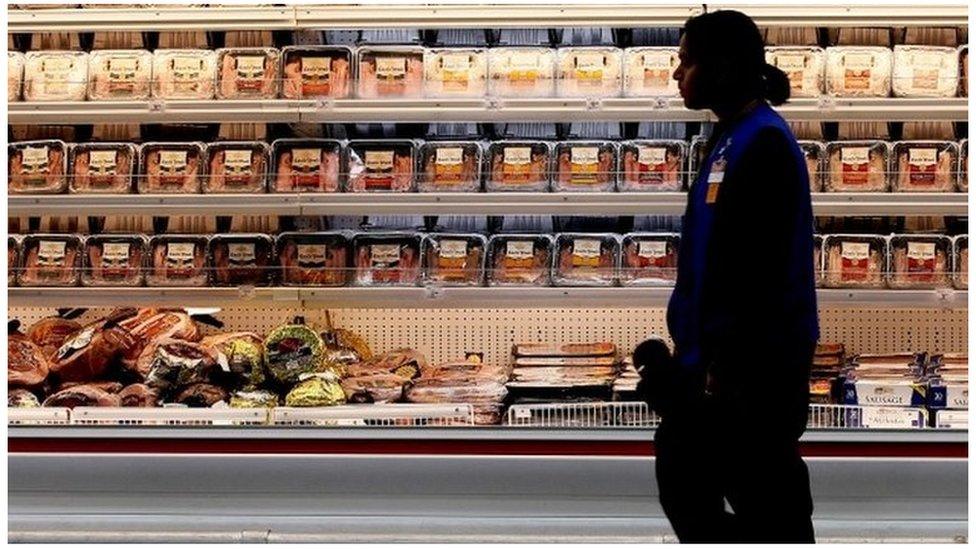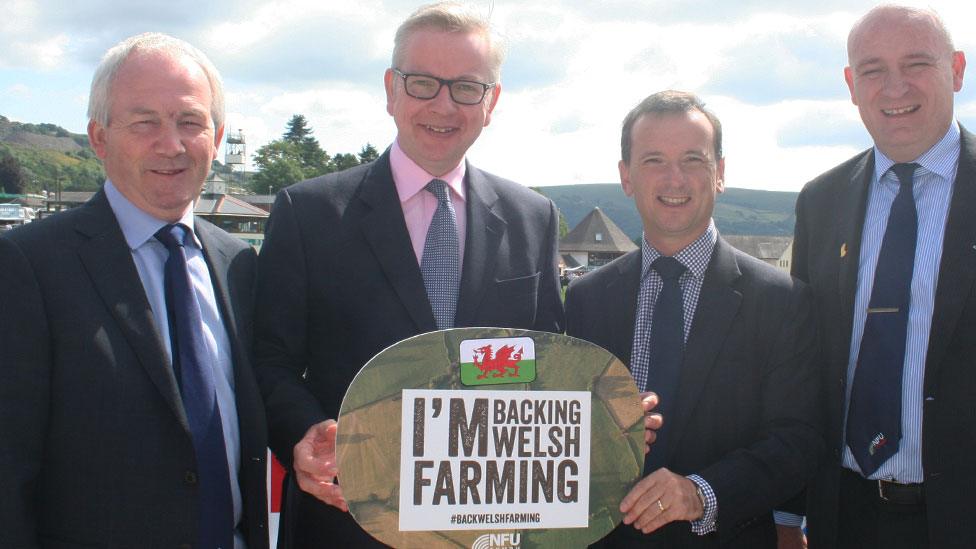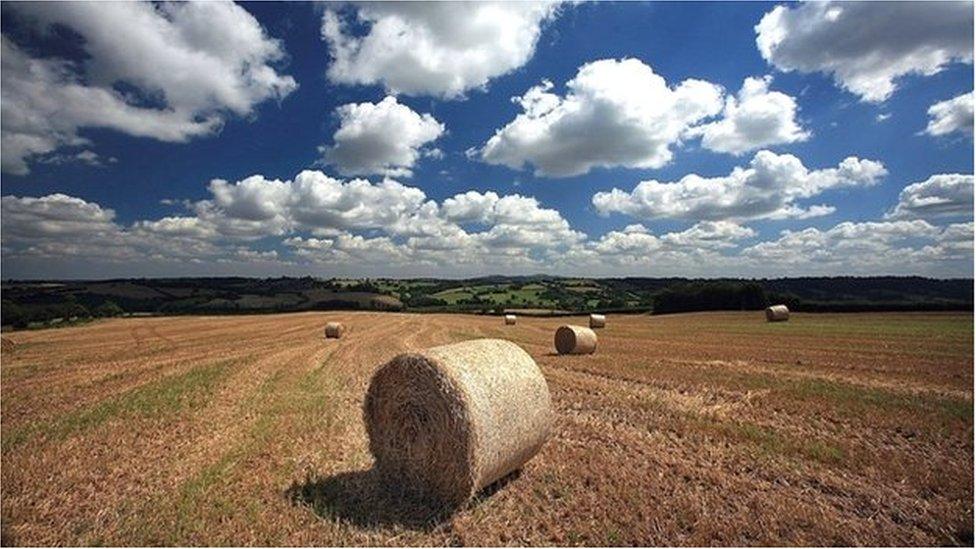Brexit: UK 'overwhelmingly reliant' on abattoir vets from EU
- Published
- comments

Up to 75% of abattoir workers are estimated to be migrants, many from the EU
The UK is "overwhelmingly reliant" on EU workers to enforce animal welfare and food hygiene standards in abattoirs, a group of peers has warned.
The Lords EU Environment Committee said it was concerned 90% of slaughterhouse vets were EU nationals and it was vital they stayed in the UK after Brexit.
Peers said there was no reason that general animal welfare standards should fall after the UK leaves the EU.
But it warned of the threat to UK firms from cheap food imports.
Guarantees over welfare standards should be written into future trade deals to protect the competitiveness of UK firms, the cross-party committee urges.
Ministers say they expect environmental and welfare standards deriving from EU membership to be maintained, as a bare minimum, after the UK leaves the EU.
But campaigners have warned they could be watered down, in some areas, as a precondition of free trade deals with the United States and other major food exporters.
On a visit to Washington on Monday, International Trade Secretary Liam Fox had to downplay reports that concerns over the lifting of a ban on US chlorinated chicken could stand in the way of a free trade agreement between the US and UK.
'Resolving riddle'
In its report, the committee said the UK was rightly proud of its high standards of animal welfare and that many of the laws in the area pre-dated the UK joining the European Economic Community in 1973.
But it said the "vast majority" of recent legislation in the field originated in EU law and although the UK was converting all existing EU law on to the domestic statute book, the existing framework could be affected.
"We see no reason why Brexit should diminish animal welfare standards, as long as the government is aware of the challenges ahead and acts accordingly," said Lord Teverson, the Lib Dem peer who chairs the committee.
But he added: "We heard evidence of undeniable concern that opening up the UK market to free global trade poses a number of issues. We heard overwhelming support for farm animal welfare standards to be maintained or improved. To help achieve that, we urge the government to secure the inclusion of high farm animal welfare standards in any free trade agreements it negotiates after Brexit."
Lord Krebs, the former chair of the Food Standards Agency, told the BBC that no-one was saying that US beef or chicken was unsafe but that the UK could not "have it both ways" when it came to a future trade deal.
"The prime minister has said after Brexit we will maintain high welfare standards in this country," he told BBC Radio 4's Today programme.
"On the other hand we hear Liam Fox saying we want to do a trade deal with America and other countries which would encourage cheaper imports, with probably lower welfare standards.
"So that is the question - do we want to maintain our own industry with high welfare standards or do you want to race to the bottom and import the cheapest meat wherever it comes from around the world?"
'Gold standard'
The committee said vets played a key role in ensuring animals were slaughtered humanely and animal shipments were properly certified, citing warnings from the British Veterinary Association that demand for certification was likely to increase if the remaining EU nations were regarded as third-party countries after Brexit.
Referring to BVA statistics suggesting more than 90% of official veterinarians, who provide government licensed services such as disease testing in animals and ante and post mortems in abattoirs, were non-UK EU nationals, it said:
"That is a concerning number because these are people who are working for our animal health, particularly in our abattoirs, and this has a knock-on effect for food safety and hygiene".
The BVA said official veterinarians, formerly known as local veterinary inspectors, had unique qualifications and were "crucial for the protection of the UK consumer, certifying and supervising the import and export of animals and animal products to third countries".
The committee said it had been told by the National Farmers Union that vets also undertook many farm inspection and enforcement roles and the union was seeking reassurances that post-Brexit immigration controls would not limit access to experienced staff.
The government has said all EU nationals living and working in the UK for five years will be entitled to apply for settled status, enjoying broadly the same rights as now, while more recent arrivals will also be guaranteed residency rights as long as they arrived before an as yet unspecified cut-off point.
In response to the Lords report, the Department for the Environment said: "Leaving the EU provides us with an opportunity to develop gold standard policies on animal welfare.
"We are determined to get a good Brexit deal for Britain, and we have been absolutely clear we will maintain our world-leading animal welfare standards," a spokesman added.
- Published24 July 2017

- Published24 July 2017

- Published21 July 2017
